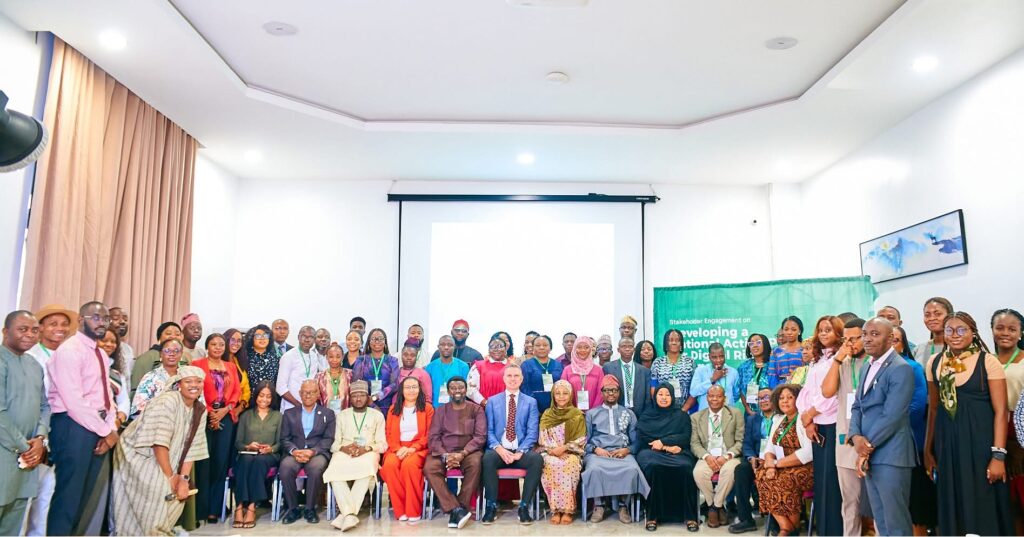By Mustapha Salisu
As part of efforts to ensure adequate protection of human rights online and safeguard democracy, Paradigm Initiative (PIN) and Nigeria’s National Human Rights Commission (NHRC) co-hosted a critical stakeholder engagement on developing Nigeria’s National Action Plan on Digital Rights.
The event, held on Wednesday, September 18, 2025, at Johnwood Hotel, Abuja, brought together government agencies, civil society, legal experts, tech advocates, and media representatives to validate research findings, identify priorities, and co-create the first draft framework to protect and promote digital rights across the country.
Giving his welcome remarks, Mr. Gbenga Sesan, Executive Director of Paradigm Initiative, welcomed stakeholders on behalf of his team and partners.
He explained that the purpose of the gathering was to have a conversation toward developing a National Action Plan for Digital Rights in Nigeria.
According to Gbenga, “The reason why today’s conversation is critical is to come up with an Action Plan that will receive the blessings of the NHRC. While Nigeria continues the journey towards getting a robust framework for digital rights in the form of law, we can at least have a rich and working content to hold on to. Until recently, we didn’t have a data protection law. What we had was a data protection regulation, which was secondary and not full-fledged, but at least it worked in the meantime.”
Citing the appointment of a bot as Minister in Albania, Mr. Gbenga stressed that once conversations on new forms of rights begin to surface, there are three key steps to take:
“Recognize that rights established offline also extend online, Recognize the work required to develop a framework that will protect the rights of Nigerians in the future and to ensure that all partners remain committed to this work” Mr. Gbenga revealed
He expressed hope that the National Action Plan would one day be presented to the public, courtesy of the collective efforts of all stakeholders.
Also speaking, Mr. Ronald Sonnemans, Deputy Head of Information at the Embassy of the Kingdom of the Netherlands, emphasized that what happens online increasingly shapes what happens offline, and therefore, rights must be protected.
“Digital rights are human rights in the digital space. Protecting digital rights is not just about saying you have the freedom, but also about protecting the very systems that enable growth in society.”
Expressing delight to witness the stakeholder engagement, he noted that for about three years, the Embassy of the Netherlands has worked with Paradigm Initiative to enhance the digital rights that Nigerians use online.
Mr. Harry Oguche Ogbe, Director of Economic, Social and Cultural Rights at the NHRC, representing Dr. Tony Ojukwu, Executive Secretary of the Commission, explained that the NAP is not just a policy document but a strategic framework to guide government institutions, civil society organizations, and the private sector in upholding digital rights as human rights.
“We are here to validate the findings of extensive research, listen to your perspectives, and also ensure that the NAP reflects the reality and aspirations of all Nigerians, especially those who are most vulnerable,” he stated.
Mr. Oguche further revealed ongoing plans to unveil the Digital Rights Advisory, an important tool applying key recommendations for safeguarding rights in the digital environment.
He identified challenges faced by citizens in the digital space, including misuse of surveillance technologies, criminalization of online expressions, lack of data protection, and poor accountability in digital governance. According to him, these are not abstract issues.
“They affect real people like journalists, activists, students, entrepreneurs, and ordinary citizens trying to make their voices heard. As a Commission, we are committed to ensuring Nigeria’s digital future is inclusive, rights respected, and anchored in the rule of law,” he said.
He called on stakeholders to commit their expertise to safeguarding Nigeria’s digital space: “Let us use this engagement to build consensus, strengthen partnerships, and chart a holistic path forward. The digital space must not be a new frontier for rights violations; it must be a platform for empowerment, equity, and justice.”
A key highlight of the engagement was the presentation of research findings on Digital Rights in Nigeria by Dr. Lukman Abdulrauf of the University of Ilorin. The study assessed the necessity and feasibility of a National Action Plan, evaluated current legal and institutional frameworks, identified key gaps, examined global best practices, and engaged with the lived experiences of citizens and stakeholders.
PRIME TIME NEWS Correspondent Mustapha Salisu and also a participant during the NAP engagement reports other highlights included breakout sessions into six groups to develop practical inputs for the National Action Plan on Digital Rights. The groups covered the following themes: Freedom of Expression & Online Content Regulation; Privacy, Data Protection & Cybersecurity as well as Access to Information and Digital Inclusion.
Others are: Gender, Youth, and Vulnerable Groups in the Digital Space; Digital Economy, Innovation & Consumer Protection as well as Accountability, Transparency, and Remedies
The session concluded with presentations of the breakout group deliberations.

